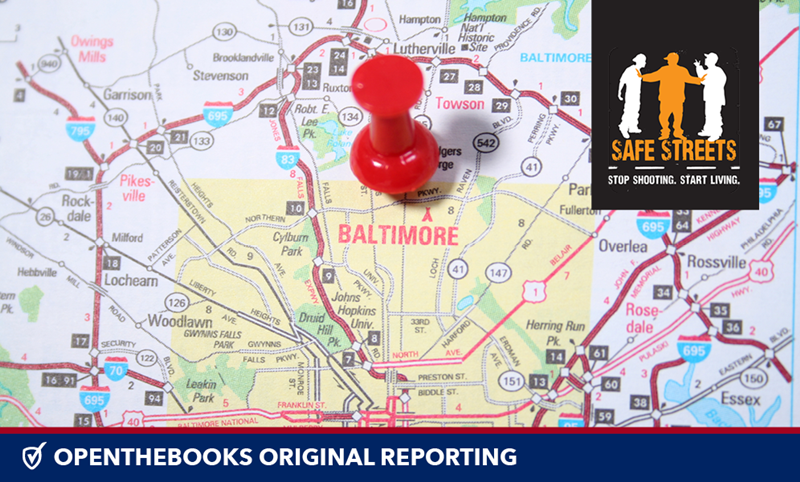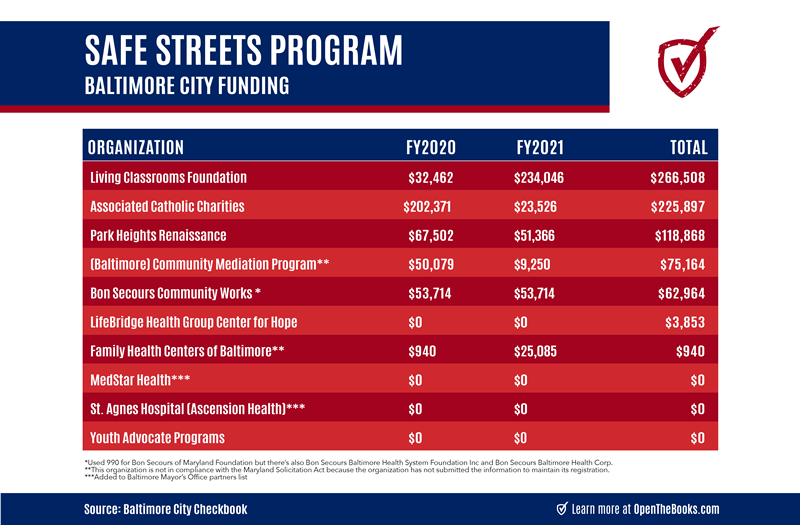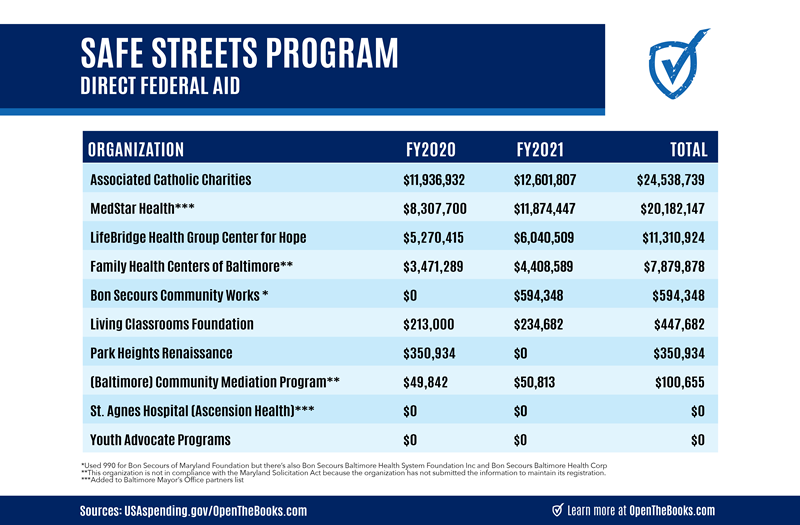

By Adam Andrzejewski | CEO OpenTheBooks.com
“Citizens need a city watchdog. Comptroller Bill Henry ran on it and needs to get serious about it.”
While it’s unclear whether a program designed to curb violence in Baltimore is working, the organizations running it continue to get millions of taxpayer dollars funded through federal, state, and city grants.
We also found that some of those non-profit organizations are not in compliance with the Charitable Solicitation Act administered by the Maryland Secretary of State.
Safe Streets, a “violence interrupter” program, is designed to de-escalate conflicts before they become violent. But three of the violence interrupters, people who know the neighborhood they’re assigned to and who try to calm tensions before they become a problem, have been killed in little more than one year.
Baltimore ranks among the cities with the highest number of per capita homicides in the country — 2021 was the seventh year in a row that saw more than 300 homicides, NPR reported.
The city program partners with non-profits to operate Safe Streets in 10 Baltimore neighborhoods but its financials are murky. Once the organizations get city funding, there’s no annual report or auditing required to see how the funds are being spent.
The program also lacks transparency – not only can’t people follow the money – there’s no proof that it has reduced violence. According to a Fox45 Baltimore analysis for eight of the neighborhoods, half saw an increase in shootings since the program began.
The station reported that Professor Joseph Richardson with the University of Maryland is studying three of the locations and expects to have the report completed by the end of 2022 or early 2023.
However, the non-profits running it continue to get city, state, and federal funding.
Fox 45 reported it’s unclear how much money Safe Streets will get from the $641 million that the city received in federal Covid-19 funding, but said the city is expected to spend about $22 million on “gun violence prevention programs like Safe Streets.”
In total, the 10 organizations running Safe Streets collected $754,194 from Baltimore City coffers in FY2020 and FY2021, according to the Baltimore City Checkbook, spent on that program and other programs offered.

The city aid in the graphic above funded ALL programs and projects at these Safe Streets vendors – not only the Safe Streets initiative.
Over the last two years, those organizations and their subsidiaries also collected $65.4 million from the federal government (2020/2021). We found this after a review of federal spending.

The federal aid in the graphic above funded ALL programs and projects at these Safe Streets vendors – not only the Safe Streets initiative.
Maryland state government pumped an additional $1.4 billion into these non-profits in FY2020-FY2021.
MedStar Health, a large healthcare organization operating more than 120 entities, including ten hospitals in the Baltimore–Washington metropolitan area, collected $1.3 billion from the state during the last two fiscal years.
St. Agnes Hospital received $56.4 million; Associated Catholic Charities collected $55 million; Youth Advocate Programs received $5.6 million; Living Classrooms Foundation got $2.4 million;
Park Heights Renaissance collected $1.6 million; LifeBridge Health Inc. received $1.2 million; Community Mediation Program collected $809,316; Bon Secours of Maryland Foundation/ Bon Secours Community Works received $199,738 and Family Health Centers of Baltimore collected $102,766.
Some, like MedStar Health, pay their executives massive salaries.
Kenneth Samet, the president and CEO, earned $7.6 million in 2020, while other executive vice presidents earned $2 million, $3.4 million and $5.5 million.
LifeBridge Health, another nonprofit healthcare corporation with several medical institutions in the Baltimore area, paid its president and CEO Neil Meltzer $2.3 million in 2020, while five other executives made between $840,569 and $1.3 million.
Smaller local nonprofits, like Living Classrooms Foundation paid its president and CEO, James Piper Bond, $304,977 and CFO Nicole Ruocco $169,536 in the year ending June 30, 2020, the latest available.
Family Health Centers of Baltimore, paid CEO Brian Aoki Hawkins $200,649 and Dr. Bernard Abbott, the chief medical officer, $199,075.
Other sources and additional reading:
Associated Catholic Charities
Bon Secours Mercy Health Inc, AKA Bon Secours Health System Inc.
Community Mediation Program
Family Health Centers of Baltimore
LifeBridge Health
Living Classroom Foundation
MedStar Health, AKA MedStar Health Research Institute
Park Heights Renaissance